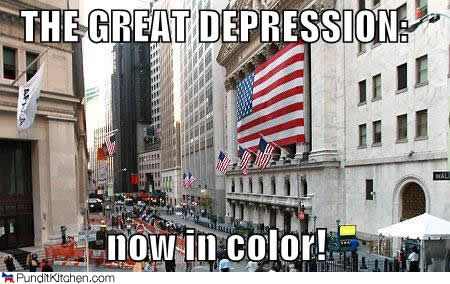
Summary of a couple of articles by Ken Rogoff, a former chief economist at the IMF. Note that the second article was written in 2008. As always, read the originals.
The Second Great Contraction by Ken Rogoff (2nd August 2011)
What is the difference between a Great Contraction and a Great Recession? A recession involves decreased output and decreased employment. A contraction or deep financial crisis also involves massive debt and credit issues which requires deleveraging, which take years to complete.
The real problem or number one problem is that the global economy is badly overleveraged, there is too much debt.
The solution is to transfer wealth from creditors to debtors. How?
- Through defaults, financial repression or inflation
- Housing: Write down mortages in exchange for a share of future home price appreciation
- Countries: Rich countries in Europe fund a larger bailout of Greece in return for higher payments in 10 to 15 years time if Greece achieves growth by then
Inflation is Now the Lesser Evil by Ken Rogoff (2nd December 2008)
Modern finance is so interwoven and complex that it is impossible to restructure one financial institution at a time.
Moderate inflation (6% for 2 years) would ameliorate but not solve current problems
Policy suggestions:
- aggressive macroeconomic stimulus
- tax cuts
- infrastructure spending
- interest rates reduced to zero
Most of the world’s largest banks are insolvent! Further defaults are bound to occur in real estate, credit cards, private equity and hedge funds. Governments will have to carry out 2nd and 3rd recapitalization.
The hole in the financial system is too big to be filled by taxpayer dollars. More Banks should be allowed to fail but this is costly and painful. Housing prices need to fall another 15% in the USA and more in Spain, UK and others.
Central Banks will keep printing money to buy government debt. The main danger will be an inflation overshoot, 20-30%.

Bill Sorry I cant find the thread where you posted a link to the “tale of two depressions” article but I thought you might be interested that they have recently updated their position. fig 1 is the interesting graph.
http://voxeu.org/index.php?q=node/7696
Ive just watched the documentary “Inside Job”
It’s about the 2008 banking crisis.
It rehashes a lot of familiar stuff but a point it makes that I haven’t come across before is the corruption of economic academia by the financial industry. They do a good job documenting how the leading academics are getting large kick backs from banks and how these leading academics are producing papers that promote the ideas that the banks smile upon.
A look at the debt crisis and consequences
http://online.barrons.com/article/SB50001424052748703711604578143300296514658.html#articleTabs_article%3D1
tomb my immediate problem with Mike Astrachan is in the way he structures his argument.
He starts out simply enough, banks go broke, are bailed out by their government which then has its debt bought up by local banks.
If its true its a good story but he introduces a couple of slights of hand. On one hand he says that the occasional large speculator buys Spanish debt and the instead of saying Spanish debt is held by Spanish banks he uses the words “domestic financial institutions” because I’m sure that he knows that Spanish banks only hold about a third of the debt while other Spanish entities hold another third and the occasional large speculator turns out to be foreign entities that hold the final third.
It looks like this site is dead but it shouldn’t be!
This site gives people the chance to explore ideas and if they want they can do the most useful thing of all, to examine what and why we get things wrong.
Now that the work of Reinhart and Rogoff has been debunked (surely you must have seen an interview with the grad student that tried to replicate their work and found that their stuff just didn’t add up) Well the people here who have been promoting austerity can re examine their positions. Same goes for those who have been arguing that hyper inflation is about to happen or that gold is a good alternative to cash or that real estate in Australia is about to crash or that China is about to crash or that things are going to get a lot worse.
My view about people getting stuff wrong has a lot to do with ideology. Take the Austrians. They believe that printing money must lead to hyper inflation. Its an ideological position that can’t be changed by reference to the fact that this has not happened. For the ideologue it must be true and if it hasn’t happened well it must be on the verge of happening because well the ideology says so.
consequences
http://www.ft.com/intl/cms/s/0/1d9bbef6-a373-11e2-8f9c-00144feabdc0.html#axzz2ROsV7qSv
Investors, in short, may rest assured that Asia’s easy money splurge is not coming to an end any time soon. Officials, however, have more reason to worry, for all this cash will ultimately drive up inflation, and asset prices, to dizzying heights.
Or we can just repeat the old errors because we refuse to challenge our most cherished ideas.